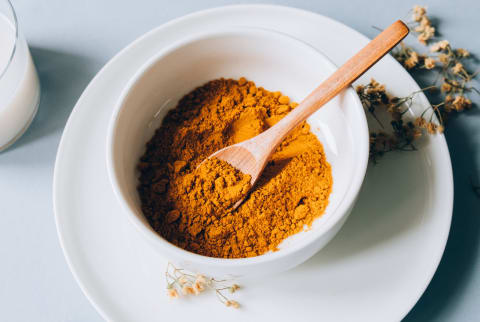Advertisement
Why We All Need Epigenetic Adaptogens, According To A Functional Medicine Expert


An adaptogen is a compound that promotes "balance" within a biochemical pathway. Sometimes that means it boosts sluggish activity; sometimes that means it calms excessive activity. It's a little bit like using a thermostat in your home: When temperatures rise above the desired level, the thermostat turns off the heat to bring the temperature down. When temperatures fall too low, the thermostat signals the heating to kick in and raise the temperature.
If you've heard the term adaptogen, it's most likely from other areas of botanical medicine. Adrenal adaptogens—such as ashwagandha and rhodiola, for example—are commonly used for stress balance and can support both underactive and overactive adrenal activity. Here, though, we're talking about adaptogens in the context of epigenetics.
Epigenetics refers to the biochemical regulators of our gene expression. In practical terms, these consist of tiny molecular compounds that attach themselves to our DNA and structures around our DNA and change how our genes are read. The most-studied of these regulators is DNA methylation.
Essentially, epigenetics has the power to change which of our genes are expressed and which are not. While we can't change our DNA, our epigenetics are heavily influenced by our diet and lifestyle, meaning we can affect our gene expression.
This is a powerful concept—it means that you can inherit some unfortunate genes and still regulate the expression of those genes more favorably. Optimizing our epigenetics has the potential to affect society's most problematic chronic diseases, including heart disease, diabetes, obesity, autoimmunity, and even cancer. It may even help turn back the hands of our biological aging clocks.
Several natural dietary compounds act as epigenetic adaptogens, helping to optimize gene expression, health outcomes, and aging. Here are six of our absolute favorites:
Cruciferous vegetables
Cruciferous veggies are rich in the epigenetic adaptogen sulforaphane1. To increase cruciferous vegetables in your diet, choose from arugula, broccoli, bok choy, Brussels sprouts, cabbage, cauliflower, horseradish, kale, kohlrabi, radish, rutabaga, wasabi, and watercress.
Berries
Berries are high in many methylation adaptogens including anthocyanins, chlorogenic acid, ellagic acid, and quercetin. Choose a variety of berries, including blackberries, blackcurrants, blueberries, raspberries, and strawberries. Smaller, wild varieties often have high concentrations of epigenetic adaptogens.
Turmeric
Turmeric's active epigenetic adaptogen is curcumin, widely known for its many beneficial health effects. Curcumin is a common ingredient in curry spices and is also available on its own right. Combine turmeric with black pepper and a little fat in your cooking for better absorption.
Shiitake mushrooms
You may already know of the potential anti-cancer benefits of Lentinus edodes, otherwise known as the shiitake mushroom. Shiitake mushrooms are also demonstrated epigenetic adaptogens. In fact, it is thought that their ability to regulate the expression of oncogenes (tumor-promoting genes) and tumor suppressor genes may be an important mechanism of action.
Rosemary
One of the main active constituents of rosemary is the methylation adaptogen rosmarinic acid. Fresh or dried rosemary makes a delicious addition to your cooking—we love it to flavor roasted vegetables, in stews and casseroles, and even as a tea with lemon or orange slices.
Green tea
Green tea contains the epigenetic adaptogen, epigallocatechin gallate (EGCG). You can get the most EGCG out of your green tea by allowing it to steep in just-boiled water for 10 minutes. Green tea also contains much less caffeine than black tea or coffee.
We are still learning more and more about epigenetics every day, but incorporating these adaptogens into your well-being routine could be a powerful choice for your overall health.